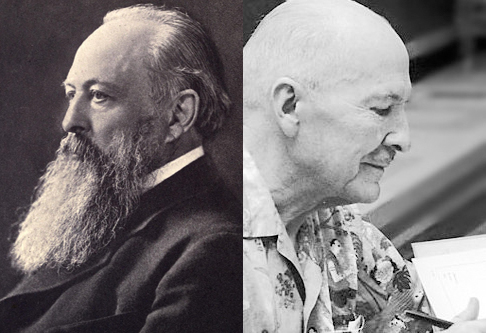
|
THE LIBERTARIAN ENTERPRISE Number 824, May 31, 2015 Neale Osborn 1964-2015 Special to L. Neil Smith's The Libertarian Enterprise
Not liking or trusting governmental power is how the United States began as a country separate from Great Britain, but as the British Lord Acton's famous quote demonstrates you don't need to be American like science-fiction author Robert A. Heinlein to distrust State power. 
Lord Acton / Robert A. Heinlein National Review editor, Rich Lowry, recently appeared on the Fox News Channel's Sean Hannity show, arguing that National Security Agency collection of metadata on a customer's telephone messaging did not violate the customer's Fourth Amendment right to be secure from government snooping because the metadata was not the customer's private property but belonged to the phone company. As an NR alumnus writer I emailed Rich pointing out that his Social Security number was issued by the government, therefore also not protectable private property, but nonetheless could be used along with other easily obtainable personal data to access bank accounts, open new lines of credit, and possibly even sell his house like in the 1995 movie The Net. Rich wrote me back with a balanced response inspiring me to write this article. The specifics of the debate on government casting a wide net to collect information on the citizenry, ever since Edward Snowden revealed the intelligence agencies were lying about not doing it, are beside my point here. I'm not seeking a balance between government doing what the Bill of Rights forbids it to do versus the utility of government employees lawyering themselves out of these prohibitions because they imagine it will enhance national security. What I am pointing out here is that such massive spying not only uncorks limits on government power established because of numerous examples of past abuse but also destroys trust in law itself—constitutional, legislative, regulatory, judicial, or even arbitral—because what is done in absolute secrecy is by nature exercise of absolute power. Have you noticed how popular mass-media purveyors of political suspicion are ubiquitous, whether partisan Democrats seeing Republicans as evil incarnate, Republicans seeing Democrats through the same paranoid lens, or maverick social critics issuing jeremiads accusing both right and left as being incurably corrupt? We are beyond the debate engendered by Edward Snowden's revelation that government is collecting massive data on the People. The debate now is given the inevitable corruption caused by absolute power exercised in absolute secrecy, how trustable is that data anyway? It's bad enough when a rogue cop can imprison a suspect by planting a gun or a bag of drugs, perhaps even smuggling it into a police station's evidence room. But what does it do to a person's ability to imagine there is actually some honesty and fairness in any system of justice if those in charge of collecting the evidence do so in such secrecy, and on such a massive scale, that the rational response by someone not even an anarchist like me is absolute paranoia?
Just click the red box (it's a button!) to pay the author
This site may receive compensation if a product is purchased
|
